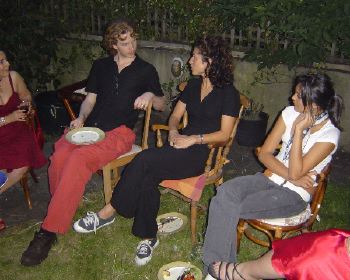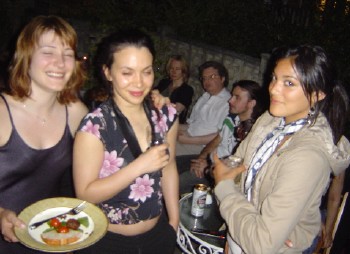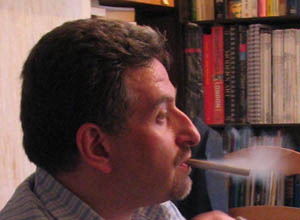We are developing the social individualist meta-context for the future. From the very serious to the extremely frivolous... lets see what is on the mind of the Samizdata people.
Samizdata, derived from Samizdat /n. - a system of clandestine publication of banned literature in the USSR [Russ.,= self-publishing house]
|
…which explains the meagre output on the blog today. Not a ‘blogger bash’, just a party.
The excuse for this bash was the visit of American writer and journalist Nancy Rommelmann and her charming daughter Tafv

Nancy listens to a lecture on why she needs to drink more Pimms

Some of the guests were surprised to hear there was not going to be a Frisbee throwing contest

Antoine was astonished to see proof that there is indeed a martial art associated with barbeque tools

The Three Furies seems rather mellow after imbibing significant amounts of Pimms

We have no idea who these two people are but they just appeared out of the gathering gloom like apparitions and ate all the fish
David Carr may have given up cigarettes but he still likes a good cigar.
Here he is, pictured at my place on Friday night, pondering the enigma wrapped in a mystery smothered in something else which I have forgotten that is Russia. This was the subject spoken about by Helen Szamuely (co-author of this blog – here is her latest, posted this morning).
Click on David if you want him to be bigger.
The thing I find most unsatisfactory about the debate over gay marriage is the widespread misunderstanding about the law as it is presently configured.
Of course, I cannot speak about the law in other countries but here in Britain same-sex marriage is not illegal it is void. There is a world of difference in those two positions.
Allow me to explain. If two men (or two women) in the UK decide that they wish to wed then they are perfectly free to engage in any type of marriage ceremony they desire accompanied by confetti, bridesmaids and any number of drunken, embarrassing relatives reeling around the dancefloor while the band plays ‘Tie a Yellow Ribbon Round The Old Oak Tree’.
Nobody is going to a lift a finger to stop them nor will they ever be subjected to any form of official censure or arrest or prosecution. However, the state will not issue a licence for that marriage and, as far as the law is concerned, there was no marriage. It never happened, it does not exist and the participants remain as two single people. → Continue reading: Markets are a many splendid (and unsplendid) thing
No lesson seems to be so deeply inculcated by the experience of life as that you should never trust experts. If you believe doctors, nothing is wholesome: if you believe the theologians, nothing is innocent: if you believe the soldiers, nothing is safe. They all require their strong wine diluted by a very large admixture of insipid common sense.
– Lord Salisbury (1877)
Some time ago, Michael Jennings of this parish caused a stir by suggesting a way of subverting the leftist intent of the staff who decide what sort of books they recommend to customers at Britain’s high street bookstores. While strictly against the rules of property, I totally sympathised with Michael’s intent and his annoyance that the bookstore seemed to be run this way.
It has not got any better in the bookshop world, as far as I can tell (at least not in Britain. Things may be different elsewhere). Earlier this week I spent a quick lunchbreak wandering around the nearby Books Etc. store in Holborn High Street. After browsing through a fairly sparsely-stocked crime and general fiction section, I took a peek at the current affairs and history section. The history bit was okay, if not particularly impressive. But the current affairs section was in a different class. It might have been stocked by the sort of folk who write for the Democratic Underground or who think Michael Moore is a sort of latter-day saint. Books by Chomsky, Gore Vidal, John Gray (a pet hate of mine); Michael Moore, of course; then various authors I have not heard of before but the titles give the general gist: “George W. Bush and the Arrogance of Power”; Why Do People Hate America?”, and blah, blah, blah. Apart from one slim volume by noted scholar of Islam Bernard Lewis, it was a total washout.
Now what is going on here? Clearly, the folk who decide what books to sell and what books to publish presumably want to make money. I tentatively offer a few explanations: the impact of higher education and direct bias from bookstore staff. Dealing with the latter point first, I have found, while chatting to the folk who work in the stores, that most tilt to the statist left. Maybe they directly get to decide what is put up in certain parts of the store. With popular fiction, they have to stock Harry Potter and Nick Hornby like everyone else, but when it comes to politics, they get freer rein. That is my take anyhow.
But I also believe higher education has an effect on all this. The serious, non-fiction parts of bookstores cater for a perceived ‘high-brow’ market. Given that humanities departments, such as political and history ones, tend to tilt to the left in my experience, it follows that the main market for such books will tend to shift the same way. There is not – yet – a big market for non-fiction with a clear libertarian and conservative leaning.
In the Internet Age, of course, this may not matter so much. But as a bibliophile it bugs me to see the biggest high street bookshops stocking so much crud.
We have been following the British government’s treatment of the armed forces for some time, when we got hold of some important information…
A document was found in a briefcase left outside Samizdata HQ. We would like to offer it back to the MOD (Ministry of Defence) but in the meantime we publish it for all to see…We believe it offers the key to understanding the thinking behind the government’s recent defence cuts rationalisation of the Armed forces to produce a more efficient, effective and capable military….
Download file: STAFF GUIDANCE ON DEFENCE RESTRUCTURING
noun. A type of collaborative on-line software that allows readers to add content on a subject, which can also be edited by others. For example: Wikipedia.
The major difference between a blog and a wiki is that a blog is more directly under the control of the owner(s) and the primary objective of a blog is for the owner(s) to express themselves to their target audience. A wiki on the other hand is about collaboration (in a general sense) rather than expressing views.
Wiki definition included as many people have asked us to describe the difference between a blog and a wiki.
Computing is sceptical about about the government’s ID card proposals and its lurch to national database.
There is, however, a reason to be even more gloomy about government technology than the committee’s collection of mid-term backbenchers imply. The government – and particularly Home Secretary David Blunkett – have become dangerously obsessive about data-centric solutions to any social issue.
In the old days, political reaction to crime scares tended to be tough-sounding but often half-baked responses like boot camps. Now it’s to build a new database.
Computing deserves full marks for asking the right question:
Does the UK have the culture, the legislation or the infrastructure for such dramatic change? We think not.
Perhaps more importantly, there has been almost no debate about privacy, civil liberties, safeguards or security. Those who have been doing most of the shouting about IT government reform are obsessive techies.
The issue is not just whether the technology works – it’s why we are using it.
via Adam Smith Institute blog
noun. Someone who only occasionally blogs.
For pictures and reporting from the Big Brother Awards check out Samizdata.net.
We went, we booed, we blogged.
The Royal Society has published its government sponsored report on nanotechnology. Professor Ann Dowling, the chair of the working group that wrote the report, produced a positive response in the press release:
The report does not find any justification for imposing a ban on the production of nanoparticles.
However, since these new technologies are uncertain and dangerous, the Royal Society called for the death of a thousand regulations. The Report concluded that all products including nanoparticles should be regulated by EU chemical regulation and the Health and Safety Executive:
Because of their novel chemical properties, the report recommends that nanoparticles and nanotubes should be treated as new chemicals under UK and European legislation, in order to trigger appropriate safety tests and clear labelling. Furthermore they should be approved – separately from chemicals in a larger form – by an independent scientific safety committee before they are permitted for use in consumer products such as cosmetics.
As the EU wishes to implement a new EU Directive (the Registration, Evaluation and Authorization of Chemicals legislation – REACH) that introduces the precautionary principle to all chemicals produced within its borders, this sounds the death knell for nascent nanotechnology within Europe. The government has obtained the authority of the scientific profession (most of which works within the public sector) to justify conforming with EU regulation.
Will Europeans lynch their leaders when they realise they have been cheated out of an Age of Miracles?
noun. A blog set up for only a limited period to cover some event (for example the E3 Games Convention). Event blogs are often commercial in nature.
|
Who Are We? The Samizdata people are a bunch of sinister and heavily armed globalist illuminati who seek to infect the entire world with the values of personal liberty and several property. Amongst our many crimes is a sense of humour and the intermittent use of British spelling.
We are also a varied group made up of social individualists, classical liberals, whigs, libertarians, extropians, futurists, ‘Porcupines’, Karl Popper fetishists, recovering neo-conservatives, crazed Ayn Rand worshipers, over-caffeinated Virginia Postrel devotees, witty Frédéric Bastiat wannabes, cypherpunks, minarchists, kritarchists and wild-eyed anarcho-capitalists from Britain, North America, Australia and Europe.
|









